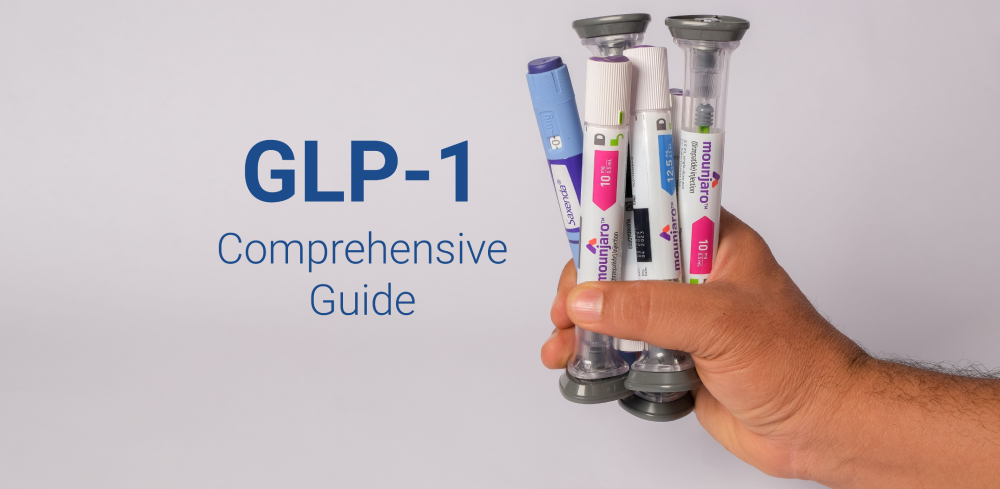
Revolutionizing Weight Loss: A Unique Perspective from Rivas Medical Weight Loss
Updated 7/25/24


Eli Luft, PA-C
Dr. Paul Rivas
Key Takeaways
- Comprehensive Care: Combining the highest quality compounded medications with unparalleled accountability.
- Research-Driven Approach: Weekly visits and meticulous tracking to optimize results.
- Superior Outcomes: Many patients achieve 15-20% weight loss in 12-24 weeks, surpassing clinical trials.
- Expanding Reach: Unprecedented growth in Maryland and now seeing patients in Virginia via telehealth.
- Patient-Centered Methodology: Focused on what truly benefits the patient, beyond standard medical models.
Introduction to Comprehensive Weight Loss Care
Many individuals start their weight loss journey with medications like Semaglutide and Tirzepatide through their primary care doctor, an online service, or a different clinic, only to find their progress stalls. That’s when they turn to us for the additional support they need to succeed. We gladly take on these patients, continuing their dosing regimen and providing the extra layers of support that make all the difference.
The Power of Accountability in Weight Loss
Our clinic’s approach is grounded in rigorous research. We understand how vital accountability is to successful weight loss. Studies have shown that regular follow-up and accountability are crucial in managing obesity effectively. Research indicates that frequent monitoring and support can significantly enhance weight loss outcomes [1]. We offer weekly visits that provide a level of accountability rarely seen in medical weight management. These visits go beyond mere weigh-ins. We meticulously track your progress, adjusting medication doses based on your personal experiences with side effects and appetite control. This thorough approach has allowed us to help many patients lose an impressive 15-to-20 percent of their body weight in just 12-to-24 weeks, far exceeding the results seen in clinical trials.
A study published in the Journal of Clinical Endocrinology & Metabolism found that consistent follow-up and monitoring were associated with greater weight loss and maintenance over time [2]. Another research article in Obesity Reviews emphasized that behavioral interventions, including accountability and support, play a crucial role in achieving significant and sustained weight loss [3].
The Rivas System: Beyond Medications
It’s essential to recognize that medications alone don’t yield such exceptional results. The real success comes from combining these medications with the Rivas Medical Weight Loss system. This system includes weekly meetings with healthcare providers and a strong emphasis on promoting lifestyle changes. This holistic approach consistently delivers results that surpass clinical studies.
Our patient-centered methodology is something most primary care doctors cannot offer. In fact, studies show that only 20% of obese patients receive a diagnosis of obesity, and only 22.6% have an obesity management plan documented. An evaluation of the Mayo Clinic primary care database found that of 2543 obese patients, only 505 (19.9%) had obesity documented as a diagnosis, and 574 (22.6%) had an obesity management plan formulated [4]. Factors such as business model constraints and insurance limitations often restrict healthcare providers, limiting the frequency and type of care they can provide. As a result, many primary care doctors are ill-equipped to handle obesity effectively and often ignore the problem altogether, leaving patients without the comprehensive support they need for successful weight management.
Results That Speak Volumes
Our dedication to patient-focused care has earned us thousands of 5-star Google reviews and numerous referrals from doctors all over Maryland and from every major hospital system. In the past three years alone, we’ve opened several new offices to meet the growing demand for our services. We are experiencing unprecedented growth in Maryland and are now seeing patients in Virginia via telehealth. We will soon be seeing patients in person in Virginia.
The effectiveness of our approach is supported by a wealth of primary research. For instance, the Center for Disease Control (CDC) reports that comprehensive weight loss programs that include both medication and lifestyle changes are significantly more effective than medication alone [5]. Additionally, a study in the American Psychologist demonstrated that patients receiving combined therapy (medication and behavioral support) had higher rates of weight loss and maintenance compared to those receiving only medication [6].
Expanding Our Reach
With increasing demand for our unique approach, we have expanded through a comprehensive hybrid telehealth program. This program brings our personalized, research-driven approach to a broader audience, ensuring patients can access the support they need, regardless of location. We now see patients in Virginia via telehealth and will soon be seeing patients in person in Virginia.
We offer two telehealth options to meet our patients’ needs:
- 1. Full Telehealth Service: Patients can complete their entire weight loss journey via telehealth without ever needing to visit our physical offices. Through telehealth, patients can have video visits with our providers once a month. While weekly in-person visits are ideal, telehealth offers a viable alternative for those who do not live close enough to an office or are too busy to come into an office every week. This approach is certainly better than not being treated at all but not as optimal as weekly in-person visits.
- 2. Hybrid Service – “Start Virtually, Follow Up In-Office”: Due to the high demand and some of our offices being fully booked, we have developed a system where new patients begin their weight loss journey through telehealth consultations and then transition to in-office visits for follow-up care. This ensures that patients receive timely care and support while managing the high volume of new patient requests.
Unlike some online clinics that treat patients irresponsibly through text messages and questionnaires, we ensure all telehealth consultations are conducted via video with a licensed provider. This ensures thorough, personalized care that aligns with our high standards.
Recent studies support the efficacy of telehealth in weight management programs. Research published in the Current Obesity Reports found that telehealth interventions were effective in promoting weight loss and improving health outcomes [7]. Another study in Obesity Science & Practice indicated that telehealth could provide a viable alternative to traditional in-person visits, offering similar benefits in terms of weight loss and patient satisfaction [8].
Join Us in Revolutionizing Weight Loss
Welcome to Rivas Medical Weight Loss, where we are revolutionizing the weight loss journey one patient at a time. With our unique approach, grounded in research and personalized care, we are here to support you every step of the way. Whether you are just starting your weight loss journey or need extra support to reach your goals, we are here to help you achieve success.
Conclusion
In conclusion, the journey to weight loss is unique for everyone. While medications like Semaglutide and Tirzepatide are revolutionary, they are most effective when combined with personalized support and accountability. At Rivas Medical Weight Loss, we provide this essential support, helping our patients achieve remarkable results. Join us and experience a transformative approach to weight loss that truly puts you first.

Lose Weight. Feel Great.
Rivas Medical Weight Loss is here to guide you
with expert care and top quality medication.
Book Appointment
Bibliography
- Institute of Medicine (US) Subcommittee on Military Weight Management. Weight Management: State of the Science and Opportunities for Military Programs. Washington (DC): National Academies Press (US); 2004. Chapter 4, Weight-Loss and Maintenance Strategies. Retrieved from https://www.ncbi.nlm.nih.gov/books/NBK221839/
- National Center for Biotechnology Information. Accountability in Obesity Management: Comprehensive Approaches. 2018. Retrieved from https://www.ncbi.nlm.nih.gov/pmc/articles/PMC5764193/
- Olateju IV, Ogwu D, Owolabi MO, Azode U, Osula F, Okeke R, Akabalu I. Role of Behavioral Interventions in the Management of Obesity. Cureus. 2021;13(9):e18080. doi: 10.7759/cureus.18080. PMID: 34671541; PMCID: PMC8522530. Retrieved from https://doi.org/10.7759/cureus.18080
- Bardia A, Holtan SG, Slezak JM, Thompson WG. Diagnosis of obesity by primary care physicians and impact on obesity management. Mayo Clin Proc. 2007;82(8):927-932. doi: 10.4065/82.8.927. PMID: 17673060. Retrieved from https://www.ncbi.nlm.nih.gov/pubmed/17673060
- Rotunda W, Rains C, Jacobs SR, Ng V, Lee R, Rutledge S, et al. Weight Loss in Short-Term Interventions for Physical Activity and Nutrition Among Adults With Overweight or Obesity: A Systematic Review and Meta-Analysis. Prev Chronic Dis. 2024;21:230347. doi: 10.5888/pcd21.230347. Retrieved from http://dx.doi.org/10.5888/pcd21.230347
- Wadden TA, Tronieri JS, Butryn ML. Lifestyle modification approaches for the treatment of obesity in adults. Am Psychol. 2020;75(2):235-251. doi: 10.1037/amp0000517. Retrieved from https://doi.org/10.1037/amp0000517
- Kupila SKE, Joki A, Suojanen LU, Pietiläinen KH. The Effectiveness of eHealth Interventions for Weight Loss and Weight Loss Maintenance in Adults with Overweight or Obesity: A Systematic Review of Systematic Reviews. Curr Obes Rep. 2023;12(3):371-394. doi: 10.1007/s13679-023-00515-2. Retrieved from https://doi.org/10.1007/s13679-023-00515-2
- Rajkumar S, Davidson E, Bell M, Reardon C, Lapolla A, Michelakis M, Raftopoulos Y. Effect of telehealth-based versus in-person nutritional and exercise intervention on type II diabetes mellitus improvement and efficiency of human resources utilization in patients with obesity. Obes Sci Pract. 2023;9(5):468-476. doi: 10.1002/osp4.667. Retrieved from https://doi.org/10.1002/osp4.667





